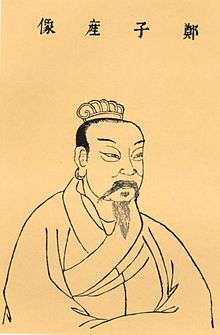Zichan

Gongsun Qiao (Chinese: 公孫僑; died 522 BC), better known by his courtesy name Zichan (Chinese: 子產), was a statesman of the State of Zheng during the Spring and Autumn period of ancient China. His ancestral surname was Ji (姬), and clan name Guo (國). A grandson of Duke Mu of Zheng, Zichan served as prime minister of Zheng from 544 BC until his death. Under Zichan, Zheng managed to expand its territory, a difficult task for a small state surrounded by several large states. Zichan reformed the government to emphasise the rule of law. As a philosopher, Zichan separated the domains of heaven and the human world, arguing against superstition and believing that humans should be grounded in reality.
Zichan was responsible for many reforms that strengthened the state of Zheng. A realist, Zichan was heavily involved in all aspects of the state, reforming agricultural and commercial laws, setting the borders, centralising the state, ensuring the hiring of capable ministers, and changing social norms. Zichan once prevented other ministers from executing a man for criticising the government, arguing that it was in the best interests of the state to listen to the opinions of the common people.
Zichan reformed the government to emphasise the rule of law. In 543 BC, he had the state's code of law cast in bronze ding, a first among the Zhou states. He also enacted harsh punishments for criminals. Because of his focus on laws, historians often classify him as a Legalist.
Zichan was also highly skilled in state-to-state politics. When the State of Jin tried to interfere in Zheng's internal affairs after the death of a Zheng minister, Zichan was well aware of the danger, arguing that if Jin was allowed to determine the successor of the deceased minister in the state of Zheng, Zheng would then have lost its sovereignty to Jin. He then proceeded to convince Jin not to interfere in Zheng's internal politics.
References
- Walker, Robert Louis. The Multi-state System of Ancient China. 1953.